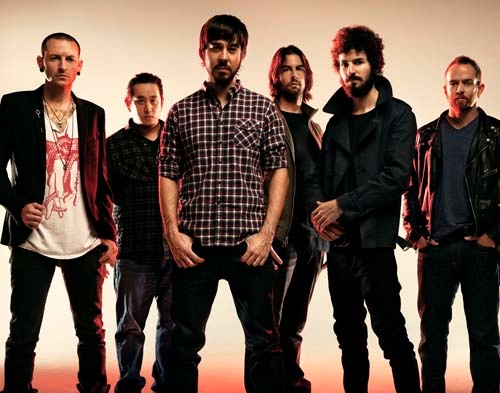Linkin Park shines with diverse sound

They’re kind of like the hard rock equivalent of a Swiss Army knife, a multipurpose thingamabob with lots of different edges, defined primarily by versatility, capable of opening wounds as well as helping mend them.
In an age where something once as straightforward as a cell phone is now an Internet portal, a global mapping device, an MP3 player, etc., all at once, Linkin Park really is a band of the times, forever multitasking, condensing genres, lassoing an abundance of sounds into a singular aesthetic.
This helps explain the band’s broad demographic, which was on loud, sweaty display at a packed MGM Grand Garden on Saturday night: rock, rap and pop fans could all find something to relate to in Linkin Park’s free-range roar, which is seemingly intended for everyone but purists.
In political parlance, these dudes are proud centrists, mostly inhabiting a middle ground that pretty much everyone can agree on.
On their latest disc, the more searching, disconsolate "A Thousand Suns," the band attempts to expand their base further still with heightened electronic flourishes, bigger keyboards, harder beats and a more expansive world view. Think CNN with the occasional mosh pit.
"We’re a broken people living under loaded gun, and it can’t be outfought, it can’t be outdone," singer/rapper Mike Shinoda shouted at the beginning of "The Catalyst," a song that encapsulated both the added digital sizzle of Linkin Park’s latest record and its less personal, more universal themes.
And so while the show began with the concussive rap-rock of "Papercut," from the band’s smash debut "Hybrid Theory," it soon galloped from the cathartic, snarling guitar rock of "Given Up" into a suite of new tunes that put the emphasis on percussion and a forceful bottom end.
From the outset, vocalists Chester Bennington and Shinoda (who also played guitars and keyboards at various times) swatted at a drum pad at the foot of the stage to unleash bass-heavy beats, and during "When They Come From Me," Bennington and guitarist Brad Delson pounded on some floor toms, creating a tribal thump as Shinoda rapped heatedly about the band’s resistance to easy categorization.
"Once you get a theory of how the thing works, everybody wants the next thing to be like the first," he noted dismissively. "I’m not a robot. I’m not a monkey. I will not dance even if the beat’s funky."
And so the dancing was left mainly to the ladies in the aisles, who swung their hips to growling chart toppers such as "Crawling" and "One Step Closer."
Linkin Park’s audience has not completely kept pace with the band’s artistic leaps. Old tunes were greeted with more enthusiasm than newer ones, though to the group’s credit, they didn’t seem to ever acknowledge as much.
"I know what it takes to move on," Bennington sang in rousing fashion during the anthemlike battle cry "Waiting for the End," and his band’s actions spoke as loudly as his bellowed out words.
If Linkin Park is currently attempting to incorporate more dance floor-friendly bombast into a hard rock context, the group that was among the first do it to a high degree of success, Brit electronica antagonists The Prodigy, opened the night with a set seemingly meant to agitate Richter scales.
Stomping through what amounted to a greatest hits show — "Breathe," "Poison," "Firestarter," to name a few — the group paired live, smash-mouth guitar and drums with concussive digital beats, leering at and taunting the crowd all the while.
The last tune they played, a savage, whiplash-courting banger with beats of anvil density, was called "Take Me to the Hospital," and clearly that was the destination they had in mind on this night.
Contact reporter Jason Bracelin at 702-383-0476 or e-mail him at jbracelin@reviewjournal.com.